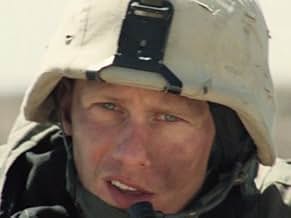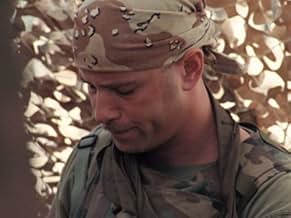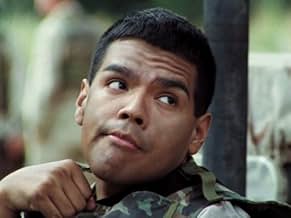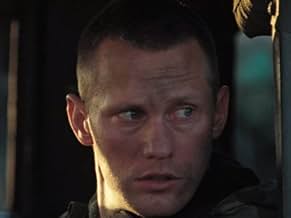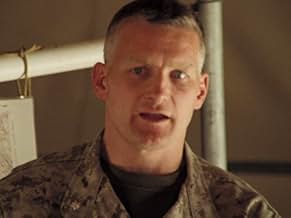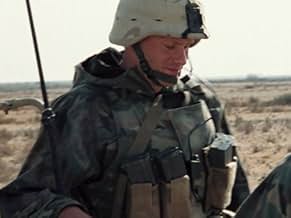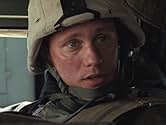2003 में बगदाद पर अमेरिकी नेतृत्व वाले हमले की पहली लहर के दौरान द फर्स्ट रिकॉन मरीन के साथ एम्बेडेड एक रोलिंग स्टोन रिपोर्टर अपने अनुभवों का वर्णन करता है.2003 में बगदाद पर अमेरिकी नेतृत्व वाले हमले की पहली लहर के दौरान द फर्स्ट रिकॉन मरीन के साथ एम्बेडेड एक रोलिंग स्टोन रिपोर्टर अपने अनुभवों का वर्णन करता है.2003 में बगदाद पर अमेरिकी नेतृत्व वाले हमले की पहली लहर के दौरान द फर्स्ट रिकॉन मरीन के साथ एम्बेडेड एक रोलिंग स्टोन रिपोर्टर अपने अनुभवों का वर्णन करता है.
- 3 प्राइमटाइम एमी जीते
- 14 जीत और कुल 22 नामांकन
एपिसोड ब्राउज़ करें
फ़ीचर्ड समीक्षाएं
10grantss
The story of 1st Marine Reconnaissance Battalion's participation in the second Allied invasion of Iraq, in 2003. Seen through the eyes of Rolling Stone reporter Evan Wright, who was embedded with the Battalion and upon whose book the series is based.
Quite brilliant. Although dramatized, this is pretty much a warts-and-all account of a military unit in combat. Hardly glamorous, it shows well the problems they face, both external and internal. Without trying to be critical or political it also shows well the fine line between being viewed as liberators and invaders: the PR aspect, or more particularly how badly the hearts-and-minds aspect of Operation Iraqi Freedom was messed up, is well examined.
Not all drama, explosions and action - there are many great comedic moments too, especially in the dialogue.
Accurate, engrossing and entertaining.
Quite brilliant. Although dramatized, this is pretty much a warts-and-all account of a military unit in combat. Hardly glamorous, it shows well the problems they face, both external and internal. Without trying to be critical or political it also shows well the fine line between being viewed as liberators and invaders: the PR aspect, or more particularly how badly the hearts-and-minds aspect of Operation Iraqi Freedom was messed up, is well examined.
Not all drama, explosions and action - there are many great comedic moments too, especially in the dialogue.
Accurate, engrossing and entertaining.
As a US Marine I can pretty much relate to everything that went on in this series... From the banter among low ranks, to the stupid games we have to endure, to living in terrible conditions, it's all here. To weapons jamming and MRE's, this series really has it all. The thing that caught my attention was how they captured the terrible leadership at times from the powers that be. I'm here to tell you there is some pitiful officers leading men into battle. And then you have some outstanding NCO's that make things happen. This series shows it all and from my perspective, this is probably as close as it gets to the real thing. Wanna be a United State Marine? This will give you a little insight on what it's like after bootcamp. Some great actors in this show and have to give all the credit to the producers and director. Guarantee they had real Marines on set making sure they got things as accurate as they were allowed. This was a solid solid series and will watch it again and again... man I miss being around my Brothers and everything that goes with being a Marine... Semper Fi Rudy!!!
I had heard of "Generation Kill" when it premiered in 2008, but was unable to view since I do not have HBO. So I forgot about it for a while until some time ago I was looking around at the local library when I just happened to sight this little, television masterpiece, and decided, especially in light of what the result of our adventure in Iraq has been in the last few years, to give it a chance. And though I can't say "Generation Kill" was necessarily my favorite viewing experience, I'm glad I did. Based off of the memoirs of a Rolling Stone reporter embedded with the 1st Marine Recon Unit during the first days of the US invasion of Iraq, it begins on the eve of that faithful event by introducing the viewer to the men of 1st Marine Recon (many of whom are based off of real life Marines), their code, standards, and every day experience. When they learn that the invasion is going ahead, they also learn that a reporter from Rolling Stone will be coming with them. Initially reluctant to having a greenhorn tag along with them, they warm up to the young writer when they learn he used to write for Penthouse, a magazine many of these young, red blooded males are familiar with! Through the production, we see the course of events through the eyes of the Marines and their "hang around" in a the most unsugar coated method possible, and we come away with no illusions about what war is really like.
What makes "Generation Kill" so different from other war productions is the fact that it strips away the unnecessary fluff and puff and presents the story in an almost character ensemble/documentary style. In "Generation Kill" there is no music score or opening theme, only the crackle and chatter of voices over the radio greets us at the beginning and end credits of each episode, multiple units and men sounding off into the dead of night, which truth be told, is far more effective than any music theme could be (That being said, the final scenes of the last episode feature a most appropriate use of Johnny Cash's "The Man Comes Around", the only recorded song used in the entire series). There is also not much in the way of heroics or glory for the simple reason that in war, there is none to be found. There are no eagles soaring, or glory sounding tunes, or any other BS like that; only following the orders of your superiors (Even if they're complete fools or incompetent), hurrying up and waiting, and of course, death and destruction.
And that last part is especially evident in "Generation", as the series pulls no punches in regards to the civilian "collateral damage" that occurred in Iraq during our invasion, and thus shows the cost civilians pay when armies, even with the best of intentions, come charging into their environment in a combat role (To those who think US troops patrolling troubled neighborhoods would be a good idea, I challenge them to watch this and then try to argue for that idea!). All of this is effectively shown through the tremendous efforts of the directors, producers, show runners, writers, and actors such as Jon Huertas, Alexander Skarsgard, Lee Tergesen, Stark Sands, Neal Jones, Michael Kelly, Chance Kelly, former real life 1st Marine Rudy Reyes, James Ransone, and many, many more who I don't have the space for. To round it up, "Generation Kill" is a mini-series that leaves nothing to the imagination when it comes to the chaos and absurd nature of conflict, be it Iraq or anywhere else. As one former Marine commented here, this is the closet thing to war short of going there and actually filming it. For a former service member to say that, you know they did something right here. If you want to see what the reality of conflict without actually being there, then check out "Generation Kill". Stay frosty.
What makes "Generation Kill" so different from other war productions is the fact that it strips away the unnecessary fluff and puff and presents the story in an almost character ensemble/documentary style. In "Generation Kill" there is no music score or opening theme, only the crackle and chatter of voices over the radio greets us at the beginning and end credits of each episode, multiple units and men sounding off into the dead of night, which truth be told, is far more effective than any music theme could be (That being said, the final scenes of the last episode feature a most appropriate use of Johnny Cash's "The Man Comes Around", the only recorded song used in the entire series). There is also not much in the way of heroics or glory for the simple reason that in war, there is none to be found. There are no eagles soaring, or glory sounding tunes, or any other BS like that; only following the orders of your superiors (Even if they're complete fools or incompetent), hurrying up and waiting, and of course, death and destruction.
And that last part is especially evident in "Generation", as the series pulls no punches in regards to the civilian "collateral damage" that occurred in Iraq during our invasion, and thus shows the cost civilians pay when armies, even with the best of intentions, come charging into their environment in a combat role (To those who think US troops patrolling troubled neighborhoods would be a good idea, I challenge them to watch this and then try to argue for that idea!). All of this is effectively shown through the tremendous efforts of the directors, producers, show runners, writers, and actors such as Jon Huertas, Alexander Skarsgard, Lee Tergesen, Stark Sands, Neal Jones, Michael Kelly, Chance Kelly, former real life 1st Marine Rudy Reyes, James Ransone, and many, many more who I don't have the space for. To round it up, "Generation Kill" is a mini-series that leaves nothing to the imagination when it comes to the chaos and absurd nature of conflict, be it Iraq or anywhere else. As one former Marine commented here, this is the closet thing to war short of going there and actually filming it. For a former service member to say that, you know they did something right here. If you want to see what the reality of conflict without actually being there, then check out "Generation Kill". Stay frosty.
10johnha-1
As a former Marine who was deployed to the same place at the same time, I think this show did an excellent job of capturing the 'essence' of what the invasion of Iraq was like to the men who were there. This show comes closer to accurately portraying wartime Marines than any other show I've ever seen. I think this is as close as Hollywood can get short of being there and filming it live. Sometimes the special effects are a little over the top, but the dress, demeanor and dialog of the characters are very accurate.
The attitudes, bearing, and language of the Marines portrayed are spot on, as well as the day to day problems and trials they encounter. I guess what I really like about this show is the lack of cheesy moto propaganda. The films are light on pro- or anti- war propaganda and heavy on truth. I'm sure some people think that the 'get some' attitude of the Marines glorifies the war while others think that pulling no punches in the collateral damage department is anti-war, but that isn't the case. These films boldly show the invasion of Iraq for what it was, for better or worse. The Marines have 'get some' attitudes in this show because Marines really have that attitude. Collateral damage, chaos and confusion among U.S. forces are in the show because it really happens in warfighting.
The attitudes, bearing, and language of the Marines portrayed are spot on, as well as the day to day problems and trials they encounter. I guess what I really like about this show is the lack of cheesy moto propaganda. The films are light on pro- or anti- war propaganda and heavy on truth. I'm sure some people think that the 'get some' attitude of the Marines glorifies the war while others think that pulling no punches in the collateral damage department is anti-war, but that isn't the case. These films boldly show the invasion of Iraq for what it was, for better or worse. The Marines have 'get some' attitudes in this show because Marines really have that attitude. Collateral damage, chaos and confusion among U.S. forces are in the show because it really happens in warfighting.
Proof that "Generation Kill", the miniseries produced by HBO films and written by David Simon and Ed Burns, their first project after the end of their television landmark "The Wire", a series which is completely incomparable in quality and scope to anything which has come before or since, is too intelligent to be concerned with simplistic political sloganeering, blind patriotism, or taking an anti-militaristic stance is the reaction which the political extremes have had to it. Any person with far right views I've spoken to or read on the internet has said similar things: this movie emasculates the marines and turns them into bleeding heart liberals (presumably because the film, and I will be referring to this as a film from this point onwards because it's definitely as much a film as "Berlin Alexanderplatz" is, has the guts to portray them as having compassion for wounded or killed civilians), and any person with far left views I've spoken to has apparently found the film to be immoral, presumably because it portrays men who spew violent, racist, homophobic, and misogynist invective as human beings.
In fact, "Generation Kill" is the farthest thing from either celebrating the military or being anti-militaristic. Like on "The Wire", David Simon and Ed Burns are on the side of the working class, as Kent Jones in Film Comment points out, and they have no interest in making a moral judgment on the nature of the work they're portraying, whether it's teaching, politics, drug dealing, or invading a country. Like Simon went beyond portraying drug dealers on "The Wire" to transporting us to their world and showing us their own problems, their own moral standards, their own worries and concerns, and introduced us to their own vernacular, he does the same with the marine corps in "Generation Kill". Like "The Wire", this is cunning and clever drama: it is political without taking sides, concerned with the inefficiency and bad planning coming 'from above' but without putting the blame on any individuals. It portrays people, some less likable and morally or politically correct than others, but people.
The only thing keeping "Generation Kill" from truly being a military version of "The Wire" is that its comparatively limited scope- it takes place within the first, 'triumphant' week of the invasion, and focuses pretty much only on one group of people. I'm entirely convinced that Simon could have written a thoroughly engrossing and fascinating drama about the Iraq war which extended past these five days, one which would have taken us past the marine corps into the lives of the other military units involved in the invasion, and the higher-ups as well, as he did starting in season 3 in "The Wire". As it stands, this is not a limitation of the power which "Generation Kill" holds, but a masterstroke in its success of making its point: every element which has made the situation in Iraq so chaotic was present in a latent form from the beginning. The film is not even really making a moral judgment of the war in Iraq, if anything it supports a well-executed version of it: most of the Iraqis we see, nearly 90% of them, are incredibly grateful, at least at this early stage, for being relieved of Saddam's rule.
Moreover, no American marine or any Iraqi is portrayed simplistically as a 'bad guy' or 'good guy', not even the bloodthirstiest of the Americans, and this writing is brought to life admirably well by the mostly perfect cast and the excellent direction and production value (it is obviously not a big-budget Hollywood film, but it still achieves real authenticity in almost every regard- the closest I came to disbelieving it was when a few Iraqis were portrayed as darker-skinned than any I've seen). The closest thing to a villain in the film is Saddam himself, who makes no literal appearance outside of posters on the streets, but then again he is pretty much the closest thing to a movie 'bad guy' in reality.
"Generation Kill" is, like "The Wire", ultimately a workplace drama about workplace politics. That the stakes are higher and that the innocent are killed even more often than they are on "The Wire" is irrelevant to the writers. This may make "Generation Kill" boring to those accustomed to and expecting a more standard war film, one which attempts an anti-war or pro-war statement. Like "The Wire" again, what the viewer is left with in the end is only a dislike of unnecessary violence and casualties, and a portrayal of the toll they take on those involved in either perpetrating the violence or those related to the victims. Both "The Wire" and "Generation Kill" are dramatically built on disappointment and disillusionment with the system in place itself, and like "The Wire" it is all about bad decisions, mistakes, and the rare good decision. The film ends with a montage and a song, much like every season of "The Wire", and with its subtle summation of the hours gone by and its emotional impact it cements David Simon's status as one of the greatest and most important writers of our time.
In fact, "Generation Kill" is the farthest thing from either celebrating the military or being anti-militaristic. Like on "The Wire", David Simon and Ed Burns are on the side of the working class, as Kent Jones in Film Comment points out, and they have no interest in making a moral judgment on the nature of the work they're portraying, whether it's teaching, politics, drug dealing, or invading a country. Like Simon went beyond portraying drug dealers on "The Wire" to transporting us to their world and showing us their own problems, their own moral standards, their own worries and concerns, and introduced us to their own vernacular, he does the same with the marine corps in "Generation Kill". Like "The Wire", this is cunning and clever drama: it is political without taking sides, concerned with the inefficiency and bad planning coming 'from above' but without putting the blame on any individuals. It portrays people, some less likable and morally or politically correct than others, but people.
The only thing keeping "Generation Kill" from truly being a military version of "The Wire" is that its comparatively limited scope- it takes place within the first, 'triumphant' week of the invasion, and focuses pretty much only on one group of people. I'm entirely convinced that Simon could have written a thoroughly engrossing and fascinating drama about the Iraq war which extended past these five days, one which would have taken us past the marine corps into the lives of the other military units involved in the invasion, and the higher-ups as well, as he did starting in season 3 in "The Wire". As it stands, this is not a limitation of the power which "Generation Kill" holds, but a masterstroke in its success of making its point: every element which has made the situation in Iraq so chaotic was present in a latent form from the beginning. The film is not even really making a moral judgment of the war in Iraq, if anything it supports a well-executed version of it: most of the Iraqis we see, nearly 90% of them, are incredibly grateful, at least at this early stage, for being relieved of Saddam's rule.
Moreover, no American marine or any Iraqi is portrayed simplistically as a 'bad guy' or 'good guy', not even the bloodthirstiest of the Americans, and this writing is brought to life admirably well by the mostly perfect cast and the excellent direction and production value (it is obviously not a big-budget Hollywood film, but it still achieves real authenticity in almost every regard- the closest I came to disbelieving it was when a few Iraqis were portrayed as darker-skinned than any I've seen). The closest thing to a villain in the film is Saddam himself, who makes no literal appearance outside of posters on the streets, but then again he is pretty much the closest thing to a movie 'bad guy' in reality.
"Generation Kill" is, like "The Wire", ultimately a workplace drama about workplace politics. That the stakes are higher and that the innocent are killed even more often than they are on "The Wire" is irrelevant to the writers. This may make "Generation Kill" boring to those accustomed to and expecting a more standard war film, one which attempts an anti-war or pro-war statement. Like "The Wire" again, what the viewer is left with in the end is only a dislike of unnecessary violence and casualties, and a portrayal of the toll they take on those involved in either perpetrating the violence or those related to the victims. Both "The Wire" and "Generation Kill" are dramatically built on disappointment and disillusionment with the system in place itself, and like "The Wire" it is all about bad decisions, mistakes, and the rare good decision. The film ends with a montage and a song, much like every season of "The Wire", and with its subtle summation of the hours gone by and its emotional impact it cements David Simon's status as one of the greatest and most important writers of our time.
क्या आपको पता है
- ट्रिवियाOn the DVD audio commentary, David Simon recalled Neal Jones's somewhat unorthodox audition for the role of Sgt. Major Sixta. According to the story, Jones entered the audition room, immediately began screaming his lines unintelligibly - much like his character does - and then walked out of the room without another word. As he opened the door to leave, he winked at casting director Alexa L. Fogel, and she realized she had the right actor for the role.
- भाव
Cpl. Gabe Garza: Hey. There's kids holding hands.
Sgt. Brad 'Iceman' Colbert: Oh cute. Don't shoot 'em, Garza.
- कनेक्शनFeatured in The 61st Primetime Emmy Awards (2009)
टॉप पसंद
रेटिंग देने के लिए साइन-इन करें और वैयक्तिकृत सुझावों के लिए वॉचलिस्ट करें
विवरण
- रिलीज़ की तारीख़
- कंट्री ऑफ़ ओरिजिन
- आधिकारिक साइट
- भाषा
- इस रूप में भी जाना जाता है
- Kiếp Quân Nhân
- फ़िल्माने की जगहें
- उत्पादन कंपनियां
- IMDbPro पर और कंपनी क्रेडिट देखें
- रंग
- पक्ष अनुपात
- 1.78 : 1
इस पेज में योगदान दें
किसी बदलाव का सुझाव दें या अनुपलब्ध कॉन्टेंट जोड़ें

![Trailer [OV] देखें](https://m.media-amazon.com/images/M/MV5BMzAyZGM1ZmItYmFkOS00Zjk1LWEzNDEtMWFhMTlkNzRhYzUxXkEyXkFqcGdeQXRyYW5zY29kZS13b3JrZmxvdw@@._V1_QL75_UX500_CR0)

